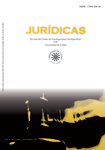Autores/as
Resumen
Constitucionalismo y Estado de Derecho se erigen como una barrera infranqueable, que protege a los individuos del ejercicio arbitrario del poder público; actualmente éstas realidades gozan de general aceptación en el mundo, así como también uno de sus elementos identifi cadores capitales que es la justicia constitucional. Sin embargo, el comienzo de ésta última suele ser un fenómeno poco estudiado, o cuando mucho se le asocia con la famosísima decisión emitida por la Corte Suprema estadounidense en Marbury vs. Madison. Al explorar el concepto de constitución – y de sus rasgos como norma fundamental, superior y suprema – y su arraigo en la cultura jurídico-política anglosajona, el presente artículo plantea una aproximación diferente a los orígenes del control constitucional: que como principio sostenedor del Estado de Derecho, el control constitucional no apareció súbitamente en una sentencia, sino que hace parte de una larga tradición, confirmada luego por la judicatura norteamericana durante las tres décadas antecedentes a la famosa decisión.
Citas
Bailyn, Bernard. (1967). The Ideological Origins of the American Revolution. Cambridge, MA: Harvard University Press.
Blackstone, William. (1818). Commentaries on the Laws of England. E. Christian (Ed.). Boston, MA: T.B. Wart.
Carr, Robert. (1970). The Supreme Court and Judicial Review. Westport, CT: Greenwood Press.
Cass, Ronald. (2001). The Rule of Law in America. Baltimore. MD: Johns Hopkins University Press.
Dewey, Donald. (1970). Marshall versus Jefferson. New York, NY: Knopf.
Greene, Jack. (2011). The Constitutional Origins of the American Revolution. Cambridge, UK: Cambridge University Press.
Hamburger, Phillip. (2004). “Law and Judicial Duty”. George Washington Law Review. 72, pp. 3-28. Washington D.C.: George Washington University.
Harrington, M. (2004). Judicial Review before John Marshall. George Washington Law Review, 72, pp. 55-78. Washington D.C.: George Washington University
Helmholz, Richard. (2009). Bonham’s Case, Judicial Review, and the Law of Nature. Journal of Legal Analysis. 1, pp. 345-346. Cambridge-MA: Oxford University Press.
Hobson, Charles. (1996). The Great Chief Justice: John Marshall and the Rule of Law. Lawrence, KS: University Press of Kansas.
Kay, Richard. (1998). “American Constitutionalism”. En: Alexander, Larry (ed.), Constitutionalism: Philosophical Foundations (p. 16). Cambridge, United Kingdom: Cambridge University Press.
Lively, Donald. (1990). Judicial Review and the Consent of the Governed. Jefferson, NC: McFarland.
Lutz, Donald. (1998). Colonial Origins of the American Constitution. Indianapolis, IN: Liberty Fund.
Mc Affee, Thomas. Inherent Rights, the Written Constitution, and Popular Sovereignty. Westport, CT: Greenwood Press.
Reid, John Phillip. (2009). Legislating the Courts: Judicial Independence in early national New Hampshire. Dekalb, IL: Northern Illinois University Press.
Saunders, Cheryl & Le Roy, Katherine. (2003). “Perspectives on the Rule of Law”. En: Saunders, Cheryl & Le Roy, Katherine. (eds.), The Rule of Law (p. 11). Sydney, Australia: Federation Press.
Shapiro, Ian. (1994). “Introduction”. En: Shapiro, Ian (ed.), The Rule of Law (p. 1). New York, NY: New York University Press, 1994.
Sherry, Suzanna. (1987). “The Founders’ Unwritten Constitution”. University of Chicago Law Review. 54, p. 1130. Chicago: University of Chicago.
Schochet, Gordon. (1979). “Introduction”. En: Pennock, Ronald & Chapman, John (eds.), Constitutionalism (p. 1). New York, NY: New York University Press.
Schwartz, Bernard. (1992). The Great Rights of Mankind. Madison, WI: Madison House.
Stourzh, Gerald. (2007). “Liberal Democracy as a Culture of Rights”. En: Stourzh, Gerald (ed.), From Vienna to Chicago and Back (pp. 314-315). Chicago, IL: The University of Chicago Press.
Thorpe, Francis. (1909). The Federal and State Constitutions, Colonial Charters, and other Organic Laws of the State, Territories, and Colonies now or heretofore forming the United States of America. Washington D.C: Govt. Print. Office.
Treanor, William. (2006). “Judicial Review before Marbury”. Stanford Law Review. 58, pp. 457-538. Palo Alto- CA: Standford University.
Jurisprudencia Inglaterra:
Case of Proclamations, 77 Eng. Rep. 1352 (1610).
Jurisprudencia Estados Unidos:
Sentencia Bayard v. Singleton, 1 N.C. (Mart.) 5 (1787).
Sentencia Commonwealth v. Caton, 8 Va. (4 Call) 5 (1782).
Sentencia Cooper v. Aaron, 358 U.S. 1 (1958).
Sentencia Hylton v. United States, 3 U.S. (3 Dall.) 171 (1796).
Sentencia Marbury v. Madison, 5 U.S. (1 Cranch) 137 (1803).
Sentencia Vanhorne’s Lessee v. Dorrance, 2 U.S. (2 Dall.) 304 (C.C.D. Pa. 1795).
Jurisprudencia Colombia:
Sentencia C-113/93
Jurisprudencia España:
Declaración 1/1992.

 PDF
PDF
 FLIP
FLIP





















